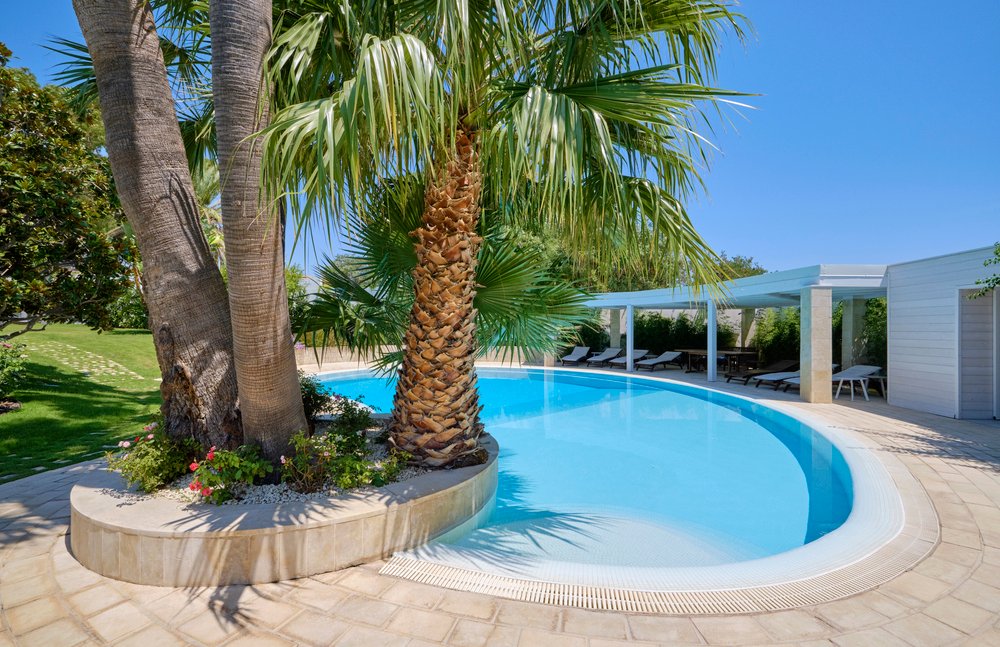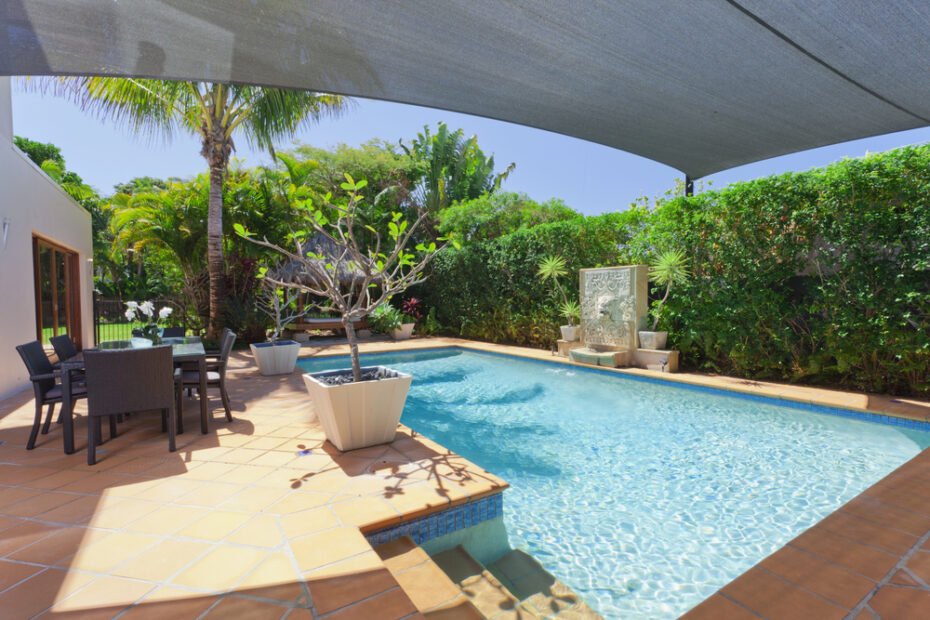Thinking about building a backyard pool in South Carolina? You’re in good company—between hot Lowcountry summers and warm Upstate afternoons, an inground pool can turn your yard into everyone’s favorite hangout. This guide breaks down real-world construction costs across the Palmetto State, what drives those numbers up or down, and smart ways to budget without regret.
Typical price ranges in South Carolina
While every project is unique, recent quotes and regional builder data point to these ballpark figures for a complete inground pool project (shell + install + basic deck + equipment) in South Carolina:
- Fiberglass: $65,000–$100,000+ for most standard projects; larger custom builds with features can exceed $150,000. Upstate builders commonly report finished projects in the $75,000–$85,000 range.
- Vinyl liner: $40,000–$75,000 for typical sizes and layouts, before premium add-ons. (Angi)
- Shotcrete/gunite (concrete): $65,000–$120,000+ depending on size, shape, soil conditions, and custom features. (Angi)
Why the wide ranges? Site conditions (sand vs. clay, flat vs. sloped), access for equipment, groundwater level, and your menu of features (spa, tanning ledge, automation, heater, water features, larger decks) have outsized effects on total cost.
What a “complete” project usually includes
Most finished pool proposals in SC wrap the following into the price:
- Pool shell & excavation (fiberglass, vinyl with steel/Polymer walls, or gunite/shotcrete structure).
- Filtration & circulation equipment (pump, filter, valves, and often a salt chlorine generator).
- Basic electrical & plumbing runs to code.
- Perimeter decking (often broom-finish concrete, sometimes pavers).
- Code-required safety barrier (a fence or alternative compliant barrier).
- Startup & brief orientation for the homeowner.
If you’re comparing quotes, confirm all six are included; “shell-only” or “pool-only” pricing can look low but leave major categories out.
Cost drivers you should plan for
1) Material & shape
- Fiberglass gives you a fast install and low maintenance; costs jump for longer shells, integrated spas, and premium gelcoat finishes. Many SC installs land in the mid-$70Ks to mid-$80Ks before substantial add-ons.
- Vinyl starts lower but anticipate liner replacement roughly every 8–12 years; that lifecycle cost matters for long-term budgets. (Angi)
- Concrete buys you total design freedom (freeform, baja shelves, deep ends, tile/glass details) with the tradeoff of higher build and maintenance cost ranges.
2) Site conditions
- Coastal sand & high water tables (Charleston, Beaufort, parts of Horry/Georgetown) may require dewatering during install, thicker bases, or special engineering.
- Piedmont clay & slopes (Greenville/Spartanburg) can add excavation, spoil hauling, or retaining walls—often a separate permit and cost line. Many jurisdictions call out retaining walls specifically. (yorkcountygov.com)
3) Access
Tight side yards or limited truck access increase labor and may require smaller equipment or handwork.
4) Utilities
Running new electrical circuits and gas lines (for heaters) must be done by SC-licensed contractors and can add several thousand dollars depending on distances and panel/gas capacity. Local permit forms explicitly require licensed trades for electrical, gas, and heater work.
5) Features & finishes
- Heaters/heat pumps, automation panels, smart lighting, tanning ledges, waterfalls, raised walls, spa additions, and premium decking (travertine/pavers) can each add from a few thousand dollars to five figures.

Permits, codes, and licensing in South Carolina
A safe, legal pool requires proper permits and licensed pros:
- Permits are required before construction in most SC jurisdictions; sub-permits may be needed for electrical, gas, and mechanical.
- Licensed contractors only: SC’s Department of Labor, Licensing and Regulation (LLR) oversees pool contractor licensing. Residential pools require appropriate licensure; trades like electrical and gas must be performed by SC-licensed contractors.
- Barriers/fencing: Many SC municipalities adopt model codes requiring a barrier at least 48 inches high for pools deeper than 24 inches, with specific gate and latch rules. Always verify your city/county’s adopted code and details.
- Public vs. residential: State DHEC (now SC Department of Environmental Services) publishes permitting/compliance guidance primarily for public pools. Residential projects are usually local-permit driven, but the state pages are useful for understanding best practices and safety expectations. (SC Environmental Services)
Pro tip: Ask your builder to specify which permits and inspections they handle versus what you must arrange. In some cities, the homeowner must also submit a site plan showing setbacks, easements, and barrier locations.
Sample line-item budget (fiberglass example)
Here’s a realistic example for budgeting a mid-size fiberglass pool in the Greenville area:
- Pool shell + excavation + set: $38,000–$48,000
- Equipment package (pump, filter, salt system, lights): $7,500–$12,000
- Electrical & gas (licensed trades): $4,000–$9,000
- Decking (400–600 sq ft broom-finish concrete): $5,000–$10,000
- Fence (meets code): $3,000–$7,000
- Misc. (waterline tile, handrails, startup, permits): $2,500–$6,000
- Estimated total: $60,000–$92,000, aligning with what regional builders are reporting for finished projects; larger/custom builds with spas/water features trend well above $100K.
Regional notes across the Palmetto State
- Charleston–Lowcountry: High water tables and sandy soils can add dewatering and engineering; older neighborhoods may have tighter access. Anecdotally, many “normal” pools now clear the low-six-figure mark once you add premium decking and features.
- Grand Strand (Myrtle Beach/Horry): Plenty of fiberglass activity; local builders emphasize that size, shape, and deck design drive costs as much as the shell itself.
- Columbia/Midlands & Upstate: Competitive market with strong fiberglass offerings; typical finished ranges begin around the mid-$60Ks and cluster in the $75K–$85K band before major add-ons.
Timeline to expect
- Design & permitting: 2–6 weeks, depending on survey/site plan needs and local review queues.
- Construction:
- Fiberglass: often 1–3 weeks once digging starts, but decking/landscaping extend the overall project.
- Vinyl: 3–6 weeks typical.
- Concrete: 8–12+ weeks due to forming, plumbing, gunite, cure times, and finishes.
(Your actual schedule hinges on weather, inspections, and trade availability.)
Ongoing (post-build) costs
- Electricity: running pumps and (if installed) heaters/heat pumps.
- Chemicals/salt: Fiberglass owners often report lower annual spend than concrete because the gelcoat resists algae better; national benchmarks place fiberglass maintenance lower than concrete year-over-year.
- Vinyl liner replacement every decade or so (plan several thousand dollars).
Ways to save without false economy
- Prioritize the shell & hydraulics. Don’t skimp on core components to afford a waterfall; you can add features later, but you won’t redo the structure easily.
- Choose a standard size/shape. Off-the-shelf fiberglass molds (or common vinyl footprints) keep costs down compared to custom geometry.
- Right-size the deck. Pour what you’ll truly use now; plan future expansions with matching joints/pavers.
- Energy-smart equipment. Variable-speed pumps and a solar cover (even if you install a heater) reduce operating costs—payback can be quick in SC’s long swim season.
- Simplify finishes. Broom-finish concrete, standard tile, and a clean rectangular design can free budget for must-have items like automation or a heat pump.
Choosing a builder: checklist for South Carolina
- Verify state licensure (pool contractor and any specialty trades). The SC LLR portals and FAQs clarify that residential pool work requires proper licensing.
- Ask for recent local references with similar soils and access constraints.
- Confirm what’s included (permits, inspections, startup chemicals, debris haul-off, grading).
- Get equipment model numbers in writing (pump, filter, heater, automation) and warranty terms.
- Request a site-specific drainage plan—especially critical in sandy soils or sloped yards.
- Clarify the barrier plan to meet the 48-inch minimum and self-closing gate requirements where adopted.
Quick FAQ
Is fiberglass the best value in SC?
For many homeowners, yes—fast installs, smooth surfaces, and low maintenance make fiberglass compelling at the $65K–$100K+ price band, with room to scale up. Concrete is ideal for complex shapes or deep diving profiles, while vinyl is the entry point for a custom footprint at lower initial cost.
How much deck should I plan?
A common starting point is 400–600 sq ft, which accommodates seating and a grill zone. Pavers are beautiful but pricier than broom-finish concrete; expanding later is common.
Do I need a fence?
Almost certainly. Many SC municipalities require a 48-inch minimum barrier for pools over 24 inches deep, with self-closing/self-latching gates. Check your local code before you buy.
The bottom line
For a typical South Carolina backyard in 2025, expect:
- Fiberglass: $65K–$100K+ (most common range), with premium builds pushing $150K+.
- Vinyl: $40K–$75K for standard projects.
- Concrete: $65K–$120K+ depending on customization.
Build with licensed pros, budget for a compliant barrier and proper utilities, and spend where it counts (structure, hydraulics, equipment). Do that, and your new pool will be less “money pit,” more “front-row ticket to summer”—for many years to come.
